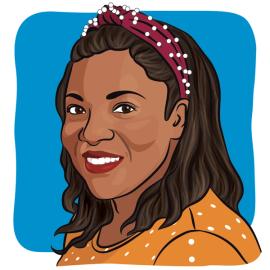- About Us
- Advertise / Support
- Editorial Board
- Contact Us
- CancerNetwork.com
- TargetedOnc.com
- OncLive.com
- OncNursingNews.com
- Terms & Conditions
- Privacy
- Do Not Sell My Information
- Washington My Health My Data
© 2025 MJH Life Sciences™ and CURE - Oncology & Cancer News for Patients & Caregivers. All rights reserved.
Having Cancer Taught Me About Self Advocacy

Tamron was diagnosed with peritoneal mesothelioma — a rare cancer caused by asbestos exposure — in 2007, as a 21-year-old new mother. As a woman diagnosed at just 21 years of age, she was anything but the typical mesothelioma patient. After more than a decade of living with mesothelioma, she began to share her experiences with others by blogging on Asbestos.com.
After being diagnosed with mesothelioma, I learned to advocate for myself, and realized that it was an incredibly important life skill to have.
If someone asked me today what was one thing that I learned during my battle with cancer, I would say that it taught me to advocate for myself.
I know some people have the impression that you must have a certain type of attitude to advocate. You may think of someone who is not afraid to speak up and speak loud, knows their stuff, and won’t take no for ananswer. But that’s so far from the truth.
When I was diagnosed with peritoneal mesothelioma 15 years ago, I knew nothing about this type of cancer, nor did I know what advocacy really meant. When you’re in a situation where you feel as if you’re going through it blindly, you have two choices: you can stop and give up or keep going until you’ve reached your breakthrough.
I chose to keep moving.
At the beginning of my diagnosis, I was referred to an oncologist who knew nothing about mesothelioma; he lacked confidence in the situation and couldn't answer the questions I asked him. I dreaded going to see him because he offered me no hope and had no treatment plan in mind.
After a couple of appointments with him, I got frustrated and thought to myself, “This can't be it. There must be a specialist out there who can help me and give me some clarification.”
My entire family was involved with looking for the right mesothelioma specialist and we found one right in my backyard. He was just at another hospital. See what happens when you don't give up? You find what you're looking for.
Here are tips that will helped me achieve self advocacy:
- Remember that no one knows your body as well as you do. I've been in situations where doctors will tell me how I'm feeling and want me to agree with it. If you're not paying attention you may end up agreeing with them and don't realize what they said until after the fact. If this happens to you just politely say, “No that's not what I'm experiencing.”
- Ask questions. Dedicate a specific notebook for your doctor's appointments and write your questions down. This will ensure that we don't forget anything during the appointment. One thing to note is that there is no such thing as a dumb question. Ask away and don't feel embarrassed about asking.
- It's OK to disagree with your physician. People may be afraid to speak up when it comes to talking with a physician. It may be because they feel as if they went to school for it and they know more. Yes, that may have some truth to it, but that doesn't indicate that they know it all! We're all humans. So, if you feel a little uneasy about something your doctor said, let them know.
- You are the patient, and you have the right to a second or third opinion. I get it you feel as if your loyalty will be questioned if you go to another doctor, but there’s no need to feel that way. Note that this is your life you're dealing with, and you want the best care. If that means switching doctors, do what you have to do.
- Review your test results. Medical technology has made huge advances over the years and patients now have access to their medical charts and test results. At times, I get my results before my doctor does. Looking at your results can provide insight into where you stand and your progress. It will also make you aware of some levels you may need to keep an eye on.
I was young when I was diagnosed with cancer and wasn't sure how to navigate the healthcare system. But as I look back, having cancer is what taught me that if I don't advocate for myself then who will?
Advocacy is a must-have life skill that I use for myself and have taught my husband and children. You are your best advocate!
For more news on cancer updates, research and education, don’t forget to subscribe to CURE®’s newsletters here.
Related Content:



